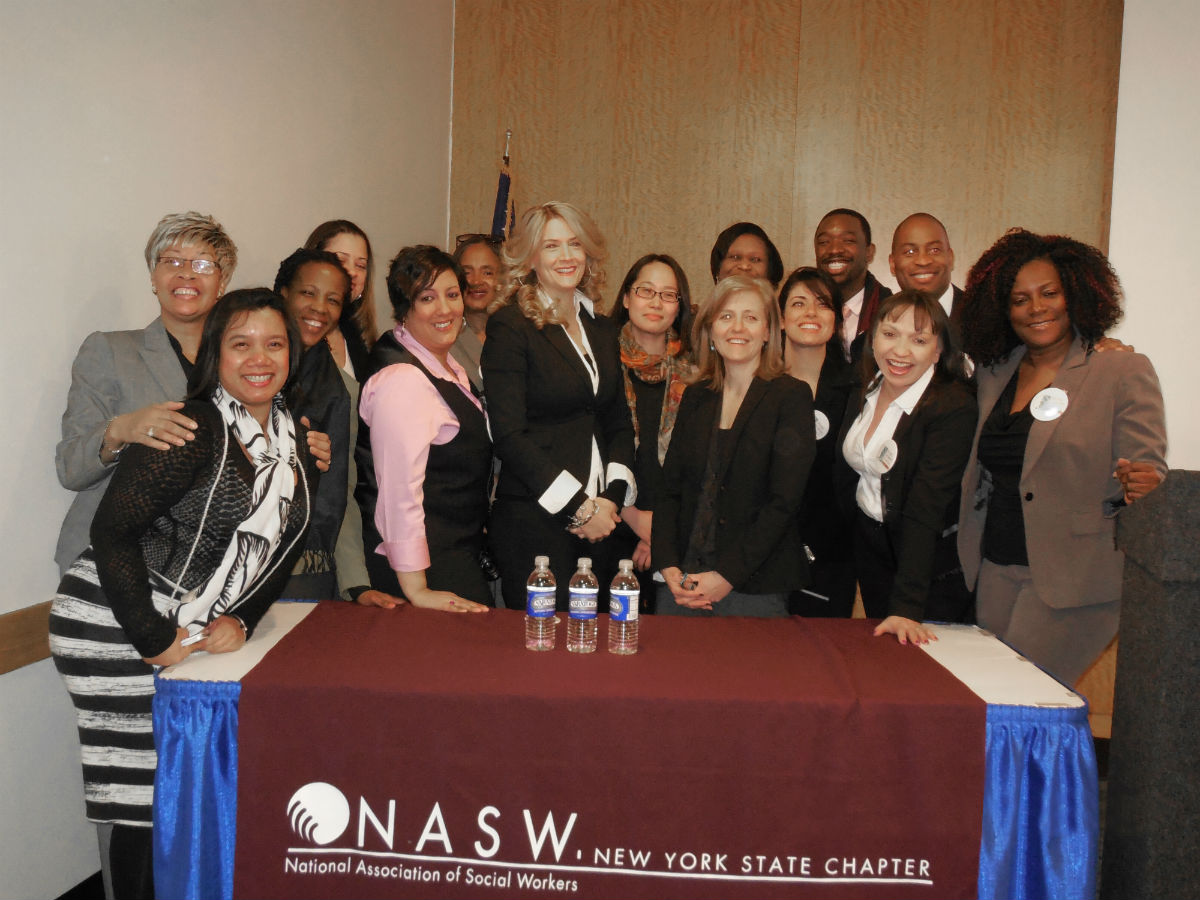News
Graduate School of Social Work Students Travel to Albany to Advocate for “Dream Act” and Loan Forgiveness
40 Students Lobby for the Undocumented

New York, N.Y. – On Tuesday, March 4, Martina Rodriguez, a student at the Touro College Graduate School of Social Work, awoke at 4 a.m. to travel from her home in Sunset Park, Brooklyn to mid-town Manhattan, where she would join 40 of her fellow students to board a bus at 6 a.m. headed for Albany.
The students, along with their professors and their dean, were on their way to advocate for New York State to pass the “Dream Act,” which would have allowed undocumented students access to state financial aid and scholarships for higher education, opened 529 tuition savings accounts to all New York youth, and established a DREAM Fund Commission to raise private funds for a college scholarship program for children of immigrants. The bill was narrowly defeated in a March 17 Senate vote.
They were also journeying to join the National Association of Social Workers (NASW), the New York Association of Deans of Schools of Social Work, and social work students and faculty from across the state to push for an increase in the state budget that would broaden the current loan forgiveness program for social workers.
“I didn’t want to miss the bus!” said Ms. Rodriguez, 43 and a single mother of three, who works as a Teacher Assistant at Fort Hamilton High School in Brooklyn. “I wanted the chance to meet assemblymen, assemblywomen and state senators. I spoke to them about how important it [was] to pass this bill for undocumented students.”
Ms. Rodriguez experienced residency problems first-hand. She came to the United States from the Dominican Republic with her father, who had a tourist visa, when she was 21. After her visa expired, she faced the hardship of finding work as an undocumented immigrant, and could only continue her education after she had married and obtained her green card. Subsequently, she earned her bachelor’s degree in education, and has been working at Fort Hamilton for 12 years.
Ms. Rodriguez said she has many immigrants in her classrooms, trying to finish high school who cannot afford college and will be aimless and lost after graduation. “They will be in the street. They are going to be stuck. They will be home or working illegally. The Dream Act [would have] put more students in college. If we can go to college we can give back to the community what we learned.”
Julie Jimenez, another student on the trip, joined the group who advocated for an increase of $500,000 to social work loan forgiveness for the next three years, an expansion of the counties eligible, and the inclusion of home care among the human services areas included for social workers to be eligible to receive the loan forgiveness.
A third-year student who works in advertising and attends school at night, Ms. Jimenez hopes to go into palliative care after graduating in May. She said she started school debt-free and now has a student loan balance of $35,000 that she expects will take six to 10 years to pay off.
Ms. Jimenez said her grandmother has dementia and is cared for at home but at some point will need a facility with social workers. “Our work is so important. We’re not just helping individuals. We’re advocating for those who can’t speak for themselves. We’re not compensated and given the same type of respect that the other professions are given,” she said.
Ms. Jimenez said the social work loan forgiveness program receives less money from the state than programs for other professionals who earn more. “The salary to debt ratio [for social workers] is very high. It’s ridiculous,” she said.
According to a fact sheet prepared by the NASW, social work is the most highly utilized of the loan forgiveness programs administered by the state and is the least funded, at $978,000; by comparison, nursing is funded at $3.9 million, district attorneys at more than $2 million, and physicians at $1.7 million.
The fact sheet states the annual starting salary of social workers in 2012 was “stagnant” at $36,000, with 52 percent reporting back in a NASW survey that they owed between $10,000 and $39,000.
“Our Albany Social Work Student Lobby Day was a tremendous achievement and an enormous undertaking,” said Dr. Steven Huberman, dean of the GSSW, who co-chaired the event as president of the New York Association of Deans of Schools of Social Work. “We had the privilege of meeting with top legislators of all political orientations, and our students had an opportunity to make a great impression as they proudly wore the large buttons ‘SOCIAL WORKERS CHANGE FUTURES.”
In addition to Dean Huberman, the lead organizers for the day from the GSSW were faculty members Jennifer Zelnick, MSW, Sc.D, chair of the Social Welfare Policy Sequence, and Allison Bobick, MSW, LCSW, director of student advancement.
Touro College's Graduate School of Social Work's Master of Social Work program trains clinical social work practitioners who assist individuals, families and communities in meeting their own needs and enhancing their well-being. The program meets all academic requirements for both social work licenses: LMSW (Licensed Master Social Worker) and LCSW (Licensed Clinical Social Worker).
Media Contact
Barbara Franklin
Director of Communications
212-463-0400 x5530
Barbara.franklin@touro.edu

